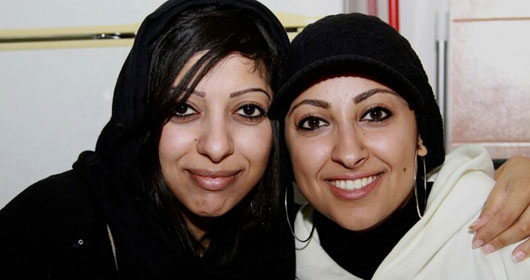Today, 1 December, is “Bahraini Women’s Day,” a holiday set by the government to honor women’s “contributions in accelerating the national development wheel in the various fields and levels.” Though a positive rhetorical sentiment, the authorities have continued to target Bahraini women human rights defenders (WHRDs) with arbitrary detention, travel bans, torture, exile, and other forms of reprisal for their work. On “Bahraini Women’s Day,” Americans for Democracy & Human Rights in Bahrain (ADHRB) highlights some of their stories.
The Government of Bahrain has repeatedly harassed Zainab al-Khawaja, who goes by the Twitter handle @angryarabiya, for her activism both online and off. During the 2011 pro–democracy protests, Zainab – daughter of the imprisoned human rights defender Abdulhadi al-Khawaja – gained nearly 50,000 followers and was a key source for documenting abuses. Because of her activism, the authorities have arrested her more than ten times, and ultimately forced her to leave the country last year. Zainab continues her work abroad alongside her sister, Maryam, who was also exiled several years earlier, in 2014, after the government began prosecuting her in reprisal for her activism. In August 2014, security forces detained Maryam on unsubstantiated charges of “assaulting two policewomen” and “insulting the king” related to her activism. Following her release on bail in September and the lifting of her travel ban in October, she left Bahrain for Denmark, where she also holds citizenship. The court convicted her in absentia on 1 December 2014 and sentenced her to one year in prison. They both continue to face online harassment, the risk of government surveillance and cyberattacks, and other forms of retaliation, while their father remains in Jau Prison serving a life sentence.
The authorities have similarly targeted human rights defender Ebtisam al-Saegh for her work documenting abuses. This year, Ebtisam faced a series of reprisal attacks for her cooperation with the United Nations and international human rights organizations. In April, following her participation in the 34th Session of the Human Rights Council (HRC), Ebtisam was the subject of a defamation campaign in pro-government media. She was subsequently targeted with a travel ban, acts of intimidation like a suspicious car fire, and threats made against her family. Then in May, Ebtisam was summoned for interrogation by the National Security Agency (NSA) where she was severely tortured by NSA security officers. Authorities threatened Ebtisam by saying that she would continue to be targeted if she did not cease all of her human rights activities. In early July, the Bahraini government arrested Ebtisam and later charged her with unsubstantiated “terrorism” charges, before temporarily releasing her after several months’ detention in poor conditions.
Bahrain’s authorities have also imposed arbitrary travel bans on dozens of other activists and WHRDs in recent years, including Nedal al-Salman, the Head of International Relations and Women’s and Children’s Rights Advocacy for the Bahrain Centre for Human Rights (BCHR), Fatima al-Halwachi, deputy-chairman of the European-Bahraini Organisation for Human Rights (EBOHR), and Zainab al-Khamees, a member of the Bahrain Human Rights Society (BHRS). The government consistently employs travel bans and the threat of similar retaliation to interfere in the work of peaceful civil society actors and prevent them from engaging the international community.
On “Bahraini Women’s Day,” ADHRB stands with Bahrain’s women human rights defenders and calls on the government to immediately end all forms of reprisal against independent civil society activists like those named above.





